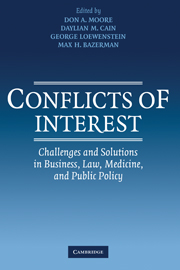Book contents
- Frontmatter
- Contents
- List of Contributors
- Acknowledgments
- Introduction
- PART ONE BUSINESS
- PART TWO MEDICINE
- PART THREE LAW
- 13 Legal Responses to Conflicts of Interest
- 14 Commentary: Conflicts of Interest Begin Where Principal–Agent Problems End
- 15 Conflicts of Interest and Strategic Ignorance of Harm
- 16 Commentary: Strategic Ignorance of Harm
- PART FOUR PUBLIC POLICY
- Index
- References
16 - Commentary: Strategic Ignorance of Harm
Published online by Cambridge University Press: 04 August 2010
- Frontmatter
- Contents
- List of Contributors
- Acknowledgments
- Introduction
- PART ONE BUSINESS
- PART TWO MEDICINE
- PART THREE LAW
- 13 Legal Responses to Conflicts of Interest
- 14 Commentary: Conflicts of Interest Begin Where Principal–Agent Problems End
- 15 Conflicts of Interest and Strategic Ignorance of Harm
- 16 Commentary: Strategic Ignorance of Harm
- PART FOUR PUBLIC POLICY
- Index
- References
Summary
Anthropologist Colin Turnbull's classic book The Mountain People (1972) describes the unfortunate tale of the Ik (pronounced “eek”). The Ik are a small group of hunters who live in the mountains separating Kenya, the Sudan, and Uganda. Uprooted by Uganda's formation of the Kidepo National Park, the Ik were forced from their traditional hunting grounds and had to turn to farming unproductive land, resulting in rampant starvation. As Turnbull describes it, in less than three generations, the once proud Ik deteriorated into a brutal people whose only goal was individual survival. The Ik have forsaken bonds of friendship and even family, abandoning the weak and letting their own children fend for themselves. The Ik, Turnbull tells us, have come to think that altruism is foolish and literally laughable.
There are several parallels to draw from the Ik to the behavior that Dana describes, wherein a substantial portion of experimental subjects would act altruistically “in broad daylight” but would act in distasteful and selfish ways so long as their actions were somewhat out of sight. First, many participants in lab experiments – especially those with formal training in economics – are like the Ik in that they often see altruism as foolish and literally laughable. I disagree: Not being altruistic is one thing, but thinking that altruism is foolish is quite another.
- Type
- Chapter
- Information
- Conflicts of InterestChallenges and Solutions in Business, Law, Medicine, and Public Policy, pp. 224 - 230Publisher: Cambridge University PressPrint publication year: 2005

